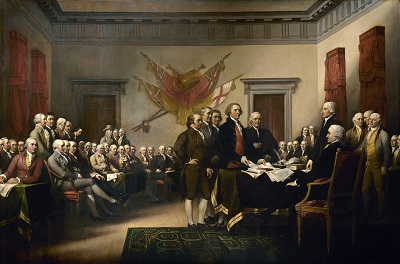But the mere establishment of independent State governments was not enough. An imperial government, also independent of England, was essential.
Continuing Declaration Of Independence (USA) Signed,
our selection from The American Colonies by John A. Doyle published in 1907. The selection is presented in 1.5 installments, each one 5 minutes long. First we conclude Jefferson’s piece. For works benefiting from the latest research see the “More information” section at the bottom of these pages.
Previously in Declaration Of Independence (USA) Signed.
Time: 1776
Place: Philadelphia

Public domain image from Wikipedia
By Thomas Jefferson
The committee rose and reported their resolution to the House. Mr. Edward Rutledge, of South Carolina, then requested the determination might be put off to the next day, as he believed his colleagues, though they disapproved of the resolution, would then join in it for the sake of unanimity. The ultimate question, whether the House would agree to the resolution of the committee, was accordingly postponed to the next day, when it was again moved, and South Carolina concurred in voting for it.
In the meantime a third member had come post from the Delaware counties, and turned the vote of that colony in favor of the resolution. Members of a different sentiment attending that morning from Pennsylvania also, her vote was changed, so that the whole twelve colonies who were authorized to vote at all, gave their voices for it; and, within a few days, the convention of New York approved of it; and thus supplied the void occasioned by the withdrawing of her delegates from the vote.
Congress proceeded the same day to consider the Declaration of Independence, which had been reported and laid on the table the Friday preceding, and on Monday referred to a committee of the whole. The pusillanimous idea that we had friends in England worth keeping terms with still haunted the minds of many. For this reason, those passages which conveyed censures on the people of England were struck out, lest they should give them offence. The clause, too, reprobating the enslaving the inhabitants of Africa, was struck out in complaisance to South Carolina and Georgia, who had never attempted to restrain the importation of slaves, and who, on the contrary, still wished to continue it.
Our northern brethren also, I believe, felt a little tender under those censures; for though their people had very few slaves themselves, yet they had been pretty considerable carriers of them to others. The debates, having taken up the greater parts of July 2d, 3d, and 4th, were, on the evening of the last, closed; the Declaration was reported by the committee, agreed to by the House, and signed by every member present except Mr. Dickinson.
By John A. Doyle
Before this it had become evident that to defer any longer the formation of an independent government was to keep up an unnecessary source of weakness. Already the voice of the nation had protested unmistakably against the longer continuance of anarchy. The first definite step toward such a change had been taken in 1775 by New Hampshire. On October 11th their delegates had petitioned Congress to allow them to establish a government, but Congress, having still hopes of the success of the petition, had deferred answering their appeal. The majority of Congress saw at last that independence was only a question of time. An answer was sent to the Convention of New Hampshire, recommending it to form a government. Similar advice was sent the next day to South Carolina, and a little later to Virginia. Yet New Hampshire shrank from so decisive a step, and coupled the formation of their new government with a studious expression of their allegiance. Virginia showed a nobler spirit.
In January the convention passed a motion, instructing their delegates to recommend Congress to throw their ports open to all nations, and thus to cast off the commercial supremacy of England. But the mere establishment of independent State governments was not enough. An imperial government, also independent of England, was essential. To establish independence without confederation would be only doing half the work. In the words of Franklin, “We must all hang together, unless we would all hang separately.” About this time Franklin’s scheme for a confederation was laid before Congress. The scheme did not include, but it evidently implied, independence. Franklin had been throughout a strenuous advocate of reconciliation, as long as reconciliation was possible, and his opinion ought to have convinced all that the time for separation had come. But the timid counsels of his colleague, Dickinson, overruled the motion, and the scheme of a confederation was not even formally considered. On February 16th the question of opening the ports was formally laid before Congress. In the next month measures were taken which clearly showed that independence was at hand. A private agent was sent to France by the authority of the committee of secret correspondence, and the instructions of the commissioners sent to Canada contained a clause inviting the people of Canada to “set up such a form of government as will be most likely in their judgment to produce their happiness.” The clause was objected to as implying independence, and gave rise to a debate, but was ultimately carried. At last, after seven weeks’ deliberation, the Congress resolved to emancipate the colonies from all commercial restrictions, and on April 6th the ports of America were thrown open to the world.
| <—Previous | Master List | Next—> |
Thomas Jefferson begins here. John A. Doyle begins here.
More information here and here, and below.
 |
We want to take this site to the next level but we need money to do that. Please contribute directly by signing up at https://www.patreon.com/history
Leave a Reply
You must be logged in to post a comment.